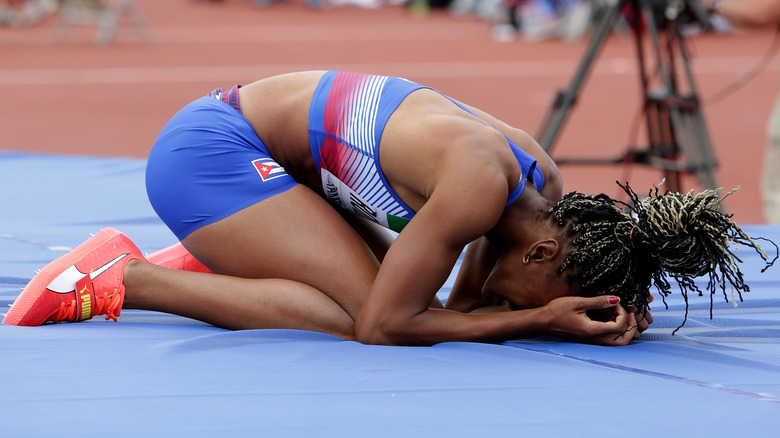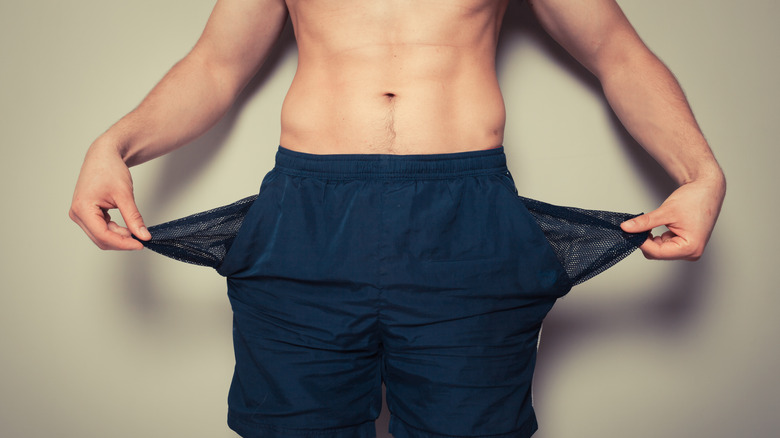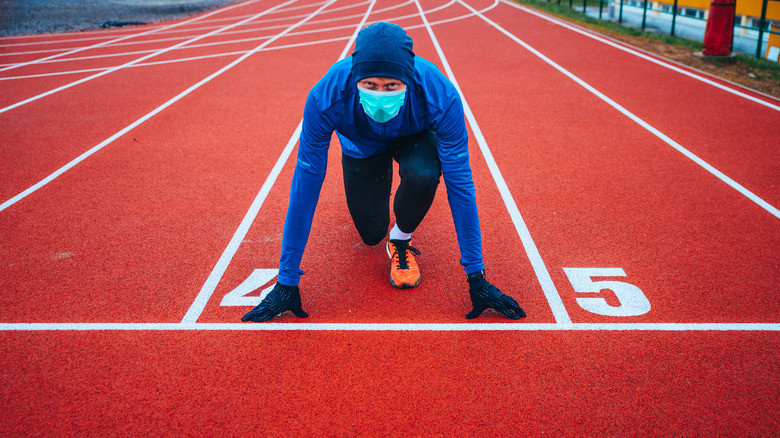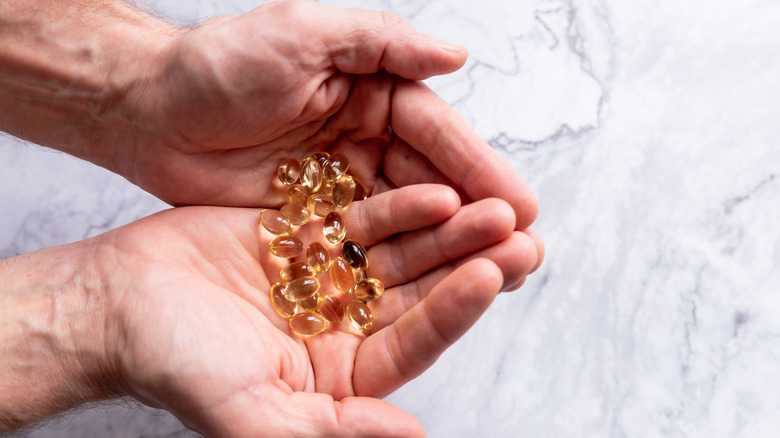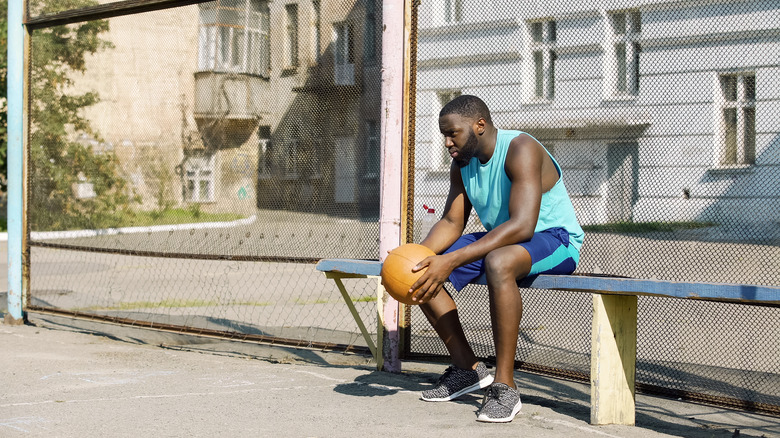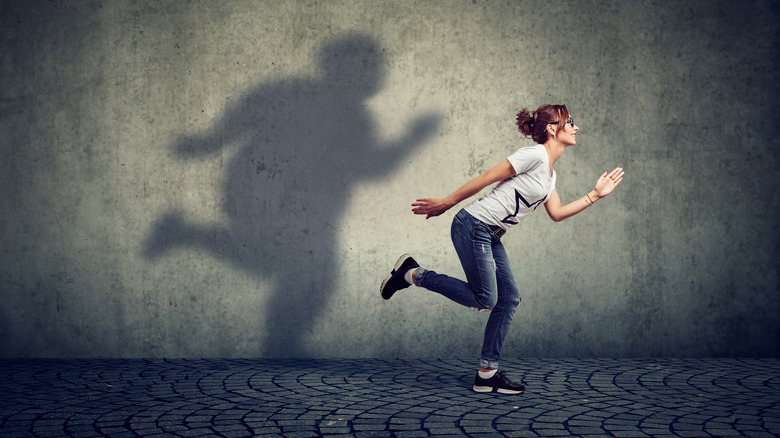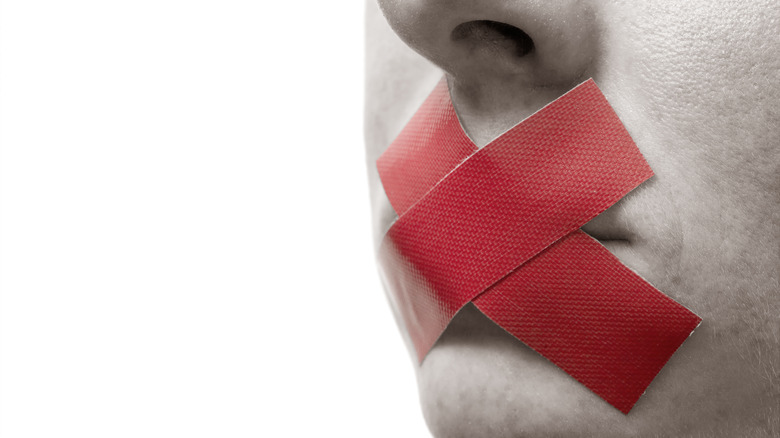The Hard Truth About Being An Olympian
Being an Olympic athlete is hard. The whole point of the Olympics is to gather the best competitors in the world, after all. These are people who have already set world records, and who have already dominated in their sport. It's world-class athletes competing against world-class athletes, so of course it's going to be exceptionally challenging.
But there's a significant upside to it all too. The gold medals, the Wheaties box appearances, the sponsorships — being an Olympian seems pretty awesome at times. You hear about the legendary parties in Olympic Villages, and it's a thrill to see incredible athletes performing at the peak of their abilities. You might wish you'd been born with some kind of world-class ability or trained hard in a sport too.
However, for all the upsides to being an Olympian, there's a significant downside — even a dark side. It's not all medals and endorsement deals. Many Olympic athletes struggle more than you might imagine, and in ways you probably don't suspect. So if you're contemplating quitting your day job and jumping (or diving, or swimming) into the long process of competing at a future Olympic Games, here's what you need to know. This is the hard truth about being an Olympian.
Training for the Olympics is ruinously expensive
If you have a kid who wants to be an Olympic athlete someday, start playing the lottery, or get really aggressive with your investments. Because training to become an Olympian costs a lot of money.
How much? According to the Huffington Post, we're talking six figures at a minimum. Speed skater Eric Flaim, who took two silver medals in his Olympic career, estimates the cost of winning those medals to be "at least" $250,000. NBC4 Washington reports that the family of Rachel and Michael Parsons, sibling figure skaters, spent $500,000 just to get a shot at making the Olympic team. Costs included ice time, choreography and dance classes, costumes, and travel expenses.
There's almost zero financial support or even earning opportunities for Olympians unless they're truly famous. CNN reports that only about half of the top-ranked track and field athletes in the U.S. make more than $15,000 a year, and IndyStar reports that most make even less — about $5,000. There's also no government financial support for American athletes, who have to rely on private funding or tiny stipends from the governing boards of their respective sports, which can be as little as $400 a month, according to the Huffington Post.
Most Olympians don't get rich
Considering that it costs six figures just to have a chance at the Olympics, you might assume there's a huge payout waiting for most Olympians. But the truth is, most Olympians don't get rich. In fact, being in the Olympics can actually hurt your earning potential.
The Guardian reports that only athletes who compete in top-rated sports have any hope of making significant money, and even then they usually have to win gold. The top fencers competing in the Olympics, for example, can expect to earn about $20,000 a year. As ESPN reports, most Olympic athletes hover just above — or sometimes below — the poverty line. The Los Angeles Times reports that when Ronda Rousey was an aspiring Olympian, she lived in her car for a time to help make ends meet.
In fact, as Wired notes, pursuing an Olympic dream can ultimately make it harder to earn a living. The intense training required usually leaves no time for education or job training, leaving many retired Olympians with little hope for a well-paid regular job. And even winning a medal doesn't make you rich — Forbes reports that the U.S. Olympic Committee awards bonuses of $25,000 for a gold medal, and just $10,000 for a bronze.
Many Olympians struggle to get an education
As you might imagine, training for the Olympics takes up a lot of time and energy. That often means that elite athletes sacrifice the schooling that many of us take for granted. As explained by the Christian Science Monitor, it can take Olympic-level athletes a decade or more to earn a college degree because they usually have to squeeze classes between intense workouts and year-round training. In the past, most Olympians participated in one or two games before retiring, but in the modern era it's increasingly common to see athletes return for four or five games, sometimes delaying their education by decades.
That's pushed the U.S. Olympic Committee and some sports governance boards to prioritize education in a way they hadn't in the past, but it's often not enough. MPR News reports that the U.S. Olympic Committee offers scholarships to athletes, but in 2017, it awarded only about a quarter of the money requested by Olympians trying to pay for college. And even if athletes attend college, they often have to schedule classes very early or very late to accommodate their training schedules, or attend school online while frequently traveling to remote areas with poor internet connections, according to the Christian Science Monitor.
Olympians get injured and sick a lot
It's easy to be in awe of the physical condition most Olympians are in. These are the best athletes in the world, people who spend most of their time training and practicing — of course they're in incredible shape. And it's easy to assume that people in such amazing physical condition are essentially superhuman.
But the fact is, injuries and illnesses are very common, and they're often debilitating. MedPage Today reports that about 10% of athletes in the 2010 winter Olympics sustained an injury during competition, with ice hockey and Alpine skiing and snowboarding causing the most injuries. The Institute for Arthroscopy & Sports Medicine in San Francisco puts the rate slightly higher, estimating that 14% of athletes are injured during the winter games and 13% during the summer games.
Olympians are also at a very high risk for sickness, especially respiratory diseases. Scientific American reports that many Olympic athletes suffer from asthma, which can be caused by extremely cold air and air pollution. NBC4 Washington reports that in the 1996 summer games, more than 20% of the participating athletes had asthma. And even events that don't seem like contact sports carry risk of injury — Team USA reports that concussion is common for synchronized swimmers because teammates are close together in the water and often get kicked in the head while practicing those elaborate routines.
Olympians get exposed to a lot of dangerous diseases
Aside from the opportunity to set world records and test your physical talents against the best of the best, the Olympics is also a chance to see the world and have unique experiences. Unfortunately, many of those unique experiences aren't necessarily the ones you might want to have. Unless the "getting the plague" is on your bucket list.
This was true even before the COVID-19 pandemic. In 2016, University of Utah Health listed the Zika virus as the primary health concern for Olympians headed to Rio that year. Number two was MRSA — the antibiotic-resistant form of the staphylococcus bacteria that can cause serious and even fatal complications — which is unfortunately common in full-contact sports, where cuts and abrasions are frequent.
Outbreak Observatory explains that infectious diseases like influenza and norovirus are common in close, cramped conditions — just like those in the Olympic Village. As noted by the Jakarta Post, several Olympic Games have been marred by outbreaks of infectious diseases, including Antwerp in 1920 (flu), Mexico in 1968 (flu), Nagano in 1998 (flu), and Rio in 2016 (Zika). In fact, as Wired reports, epidemiologists think of the Olympics as opportunities to study infectious diseases and how they spread.
Doping false-positives are surprisingly common at the Olympics
The fastest way to destroy your reputation as a world-class athlete is to get caught doping — something Marion Jones and Lance Armstrong can both attest to. While most of us would agree that Olympians who use performance-enhancing drugs deserve all the punishment they get, it's depressingly easy to be falsely accused of doping.
It's so easy, in fact, that when U.S. middle-distance runner Shelby Houlihan claimed she tested positive for a banned steroid called nandrolone because of a burrito she ate, the excuse wasn't totally crazy, according to Slate. Nandrolone isn't commonly abused these days, but it is a common contaminant in meat.
Accidental positives are a growing problem. The New York Times reports that it really is possible to ingest a banned substance entirely by accident, as happened when sprinter LaShawn Merritt bought a male-enhancement product called ExtenZe at a 7-11. He didn't know the supplement contained two banned steroid derivatives. And, Slate notes, dietary supplements are increasingly blamed for trace amounts of banned substances, and the resulting disqualifications and career wreckage. The real issue is a 1994 change to the laws governing these supplements that makes it very difficult to police what's in them or the claims they market to their customers.
Depression is depressingly common in Olympians
Any athlete will tell you that the mental aspect is just as important as the physical aspect of competition. Yet the mental aspect is often totally ignored after the medals have been handed out. SELF reports that mental health disorders are common among the elite level of athletes who typically compete at the Olympics. The Atlantic explains that the intense concentration and sustained adrenaline that makes the Olympics such an amazing experience for these athletes is almost impossible to recapture once the competition is over. The resulting mental exhaustion is often a precursor to clinical depression.
Olympic swimmer Allison Schmitt explains one aspect of the problem (via the Huffington Post) — Olympians have spent their lives pushing through pain and denying impairment in order to stay in the game. TopResume explains that training and competing is a highly-structured life, and that when it suddenly ends, athletes can find themselves confused as to how to manage their time, all while dealing with a loss of identity now that they're no longer defined as an Olympic athlete. Altogether, it's a recipe for bad mental health.
If you or someone you know is struggling with mental health, please contact the Crisis Text Line by texting HOME to 741741, call the National Alliance on Mental Illness helpline at 1-800-950-NAMI (6264), or visit the National Institute of Mental Health website.
It's easy for Olympians to be forgotten
Chances are the Olympians you remember are the ones that won gold medals. But sometimes the difference between gold and silver is incredibly small. For example, you probably know that Michael Phelps has won a boatload of gold medals (23 in all), but you probably don't remember that, as Wired explains, in 2008 Phelps beat Serbia's Milorad Cavic by 4.7 millimeters in the 100-meter butterfly event. Milorad had actually set an Olympic record earlier in the event, but most people only remember Phelps' phenomenal finish.
These kinds of extremely close finishes are fairly common. Buzzfeed reports that in 2016, the winner of the sculling competition had to be determined by photo because it was so close. Thousands of athletes compete at the Olympics every four years. According to NPR, there were nearly 3,000 athletes involved in the Winter Olympics in Pyeongchang in 2018. The vast majority of Olympic athletes don't get much media attention, or sponsorship deals, even if they come incredibly close to medaling.
Today reports that whereas bronze medalists are typically more content, silver medalists often experience depression and stress because they came so close to winning.
Olympians are sometimes kidnapped, bombed, or victims of terrorist attacks
The Olympics is typically an event that brings the world together, celebrating peaceful, healthy competition, and a spirit of collaboration. The athletes who compete are usually treated as celebrities and visiting dignitaries by the host nation — if only for the duration of the games. But being on an international stage, sometimes in countries with strained or even corrupt law enforcement system, sometimes puts athletes in danger.
History reminds us of the most famous incident of terrorism at the Olympics, when Palestinian terrorists took Israeli athletes hostage in the Olympic Village at the 1972 games in Munich. The incident ended with 11 Israelis and a West German policeman dead, according to Britannica. The Guardian reports that as recently as 1996 a massacre was avoided at the Atlanta Olympics, when a part-time security guard named Richard Jewell spotted a suspicious-looking backpack and notified authorities.
And, as reported by the New York Post, at the 2016 Olympic Games in Rio, New Zealand jiu-jitsu athlete Jason Lee reported that he'd been kidnapped — by the local police, no less — and that he was forced to withdraw money from an ATM for his captors. The bottom line? Olympians are often targets of crime and terrorism when they arrive in the country hosting the event.
Olympians are often lonely and isolated
It's natural to see someone at the absolute top of their chosen sport and see only the skill, medals, and adulation. But, as BBC Sport explains, elite athletes often have no one to turn to when injuries or mistakes cost them a medal, leaving them feeling isolated. There are very few people who understand what it's like to be an Olympian, after all.
According to the Varsity, depression and loneliness afflict Olympians competing in individual sports most acutely. But even in team sports, athletes often feel isolated and unable to express themselves, especially if they worry that admitting depression or fear will be seen as weak and change their teammates' perception of them.
Even those who do take home the gold aren't immune from struggles with mental health. The Guardian reports that even Michael Phelps felt the crushing loneliness of being an Olympian, struggling with alcohol and entering rehab, and gold medalist Ian Thorpe wrote candidly about his struggles with loneliness and depression in his autobiography.
If you or someone you know is struggling with mental health, please contact the Crisis Text Line by texting HOME to 741741, call the National Alliance on Mental Illness helpline at 1-800-950-NAMI (6264), or visit the National Institute of Mental Health website.
Olympians often struggle with their body image
You might imagine that the elite athletes who compete at the Olympics each year are pretty comfortable with their bodies. After all, they have to be in amazing shape just to qualify, much less win a medal.
But, according to CBC Sports, athletes often develop eating disorders and body image problems. This is in part because competitive athletes are often hyper-focused on their weight and other aspects of their bodies. At the high levels, even the slightest bit of extra weight or weak muscle can make a difference. In addition, athletes are constantly faced with competitors who may be larger or smaller or simply in better shape. And finally, sponsorships and endorsement deals — sometimes the only route to financial stability for Olympians — often demand a certain look that is not always in line with a healthy physique.
GoodTherapy explains that many Olympians are pushed into eating disorders by their own coaches and trainers, who may instruct them to lose weight to gain an edge. When controlled diet and exercise is combined with body image issue exacerbated by comparisons to other athletes, it's easy to see how eating disorders can develop.
If you are struggling with an eating disorder, or know someone who is, help is available. Visit the National Eating Disorders Association website or contact NEDA's Live Helpline at 1-800-931-2237. You can also receive 24/7 Crisis Support via text (send NEDA to 741-741).
Some Olympians sacrifice their free speech
Olympians find themselves on the biggest stage in the world and the focus of the international media. But the Olympics have long been marketed as an opportunity for the world to set aside its problems and differences, and a place to come together in celebration of what binds us. As such, remarkably few athletes use the their time in the spotlight to speak out on issues important to them. There's a very good reason for this — Forbes explains that Rule 50 of the Olympic charter expressly forbids participating athletes from any form of protest or politically motivated demonstration. In other words, if you want to compete in the Olympics, you must agree to keep your mouth shut.
Play the Game reports that Olympians are starting to mount a resistance to this gag rule. In 2020, a group of athletes sent an open letter to the International Olympic Committee (IOC) asking for the rule to be changed or eliminated. Reuters reports that these efforts are supported by Germany's athletic association, Athleten Deutschland, which noted that the wave of protests in the wake of George Floyd's murder in 2020 makes it clear that Rule 50 is an outdated and even dangerous concept. The association issued that statement that said, "Athletes should be free to peacefully declare their support for the values of our free and democratic society at any time."
The outcry didn't work. According to USA Today, the IOC decided in April 2021 that Rule 50 still stands, and punishment for breaking it will be determined collectively by the IOC, the specific sport's international federation, and the athletes' home country Olympic committee.
